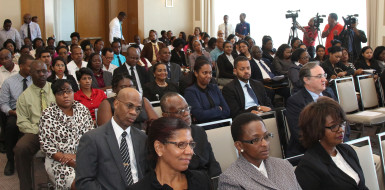Declaring that “our menfolk are going berserk,” acting Chancellor of the Judiciary Justice Carl Singh yesterday said while he believes that perpetrators of domestic abuse should be prosecuted, there is need for a shift in focus from punishment to education.
Justice Singh made these remarks during the commencement of a two-day seminar focused on combatting domestic abuse in Guyana, hosted by the Commonwealth Secretariat in collaboration with the Judiciary of Guyana and the Commonwealth Magistrates’ and Judges’ Association.
The seminar, hosted at the Marriott Hotel, was well attended by various members of the criminal justice fraternity, including judges and magistrates, Police Commissioner Seelall Persaud, Crime Chief Wendell Blanhum, several police prosecutors and members of various nongovernmental organisations. Minister of Social Protection Volda Lawrence was also present as were representatives from the ministry of Public Health.

During his remarks at the opening, Justice Singh said that he was alarmed at the high rate of domestic violence cases being reported in Guyana. He further expressed abhorrence at the viciousness and brutality with which these cases occurred.
He, however, said education should be the response. According to Justice Singh, education of the young in society should be seen as a key step in fighting domestic violence. He noted that children who are exposed to domestic violence may suffer from mental health issues later in their lives due to the cumulative effects of abuse. He further emphasised that there should be a shift away from the punishment of offenders to a system where gain is created through education.Similarly, President David Granger, in his keynote address, stressed that while the law can punish persons for their actions, it cannot eradicate violence.
Rather, he said, the causes of domestic violence should be identified and campaigns must aim at changing the culture and attitudes of citizens.
“Guyanese, a generation ago, may have regarded domestic violence as a private matter: a man hitting his wife was considered a family affair; a parent or teacher whipping the child – what we call giving “licks” – was the conventional and even commendable form of correction,” Granger said. He continued, “School fights were considered a regular part of the curriculum and we dismissed it with a comment that “boys will be boys.” We need time to undo decades of a culture of criminal violence. The removal of inequalities, therefore, both in the home and in the State, is a prerequisite of a happy home and a gentle country.”
According to the Head of State, violence in the broader sense cannot be separated from violence within the family setting. He explained that criminal violence and domestic violence are both aimed at domination and, while criminal violence demonstrated inequality in society, domestic violence was a sign of inequality in relationships.
Thus, he said, in order to significantly reduce and eradicate domestic violence, a sincere and serious approach is needed to ensure equality for women, girls, and other minorities.
Additionally, he said that while reflection of cultural attitudes shows that domestic violence is often seen as a “family matter,” abuse and its multiple forms are now far from acceptable.
The seminar, aimed at providing a hub for the various interest groups to discuss major issues they are confronted with when dealing with domestic abuse cases, spanned an array of knowledge areas. These areas were presented by experts from across the Commonwealth region.
Though it had been slated to end by early afternoon, discussions went into the evening. Among the topics discussed at yesterday’s seminar were “The local experience of domestic abuse,” presented by activist Karen de Souza; “The police experiences of domestic abuse,” by Detective Sergeant Michelle Miller; “Domestic abuse – the underlying causes,” covered by Dr. Dianne Douglas; and “The influence of media on domestic abuse,” by Dr. Meena Shivdas.
While yesterday’s seminar was open to both governmental and nongovernmental organisations, today’s session will only provide training to members of the judiciary.





